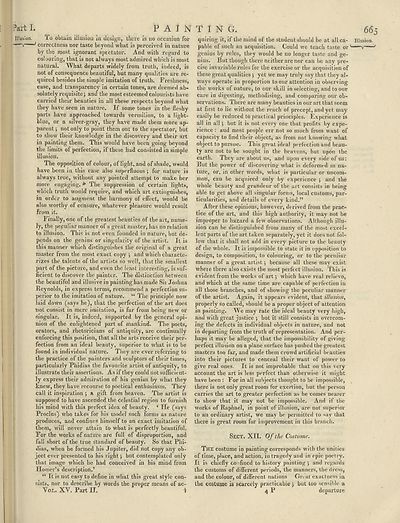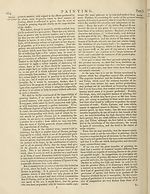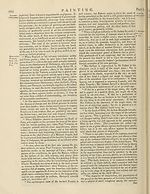Encyclopaedia Britannica > Volume 15, NIC-PAR
(741) Page 665
Download files
Complete book:
Individual page:
Thumbnail gallery: Grid view | List view

1 Fart I. PAIN
Illusion. To obtain illusion in design, there is no occasion for
> -y—correctness nor taste beyond what is perceived in nature
by the most ignorant spectator. And with regard to
colouring, that is not always most admired which is most
natural. What departs widely from truth, indeed, is
not of consequence beautiful, but many qualities are re¬
quired besides the simple imitation of truth. Freshness,
ease, and transparency in certain tones, are deemed ab¬
solutely requisite j and the most esteemed colourists have
carried their beauties in all these respects beyond what
they have seen in nature. If some tones in the fleshy
parts have approached towards vermilion, to a light-
blue, or a silver-gray, they have made them more ap¬
parent ; not only to point them out to the spectator, but
to show their knowledge in the discovery and their art
in painting them. This would have been going beyond
the limits of perfection, if these had consisted in simple
illusion.
The opposition of colour, of light, and of shade, wsuld
have been in this case also superfluous; for nature is
always true, without any pointed attempt to make her
more engaging. * The suppression of certain lights,
which truth would require, and which art extinguishes,
in order to augment the harmony of effect, would be
also worthy of censure, whatever pleasure would result
from it.
Finally, one of the greatest beauties of the art, name¬
ly, the peculiar manner of a great master, has no relation
to illusion. This is not even founded in nature, but de¬
pends on the genius or singularity of the artist. It is
this manner which distinguishes the original of a great
master from the most exact copy ; and which characte¬
rizes the talents of the artists so well, that the smallest
part of the picture, and even the least interesting, is suf¬
ficient to discover the painter. The distinction between
the beautiful and illusive in painting has made Sir Joshua
Reynolds, in express terms, recommend a perfection su¬
perior to the imitation of nature. “ The principle now
laid down (says he), that the perfection of the art does
hot consist in mere imitation, is far from being new or
singular. It is, indeed, supported by the general opi¬
nion of the enlightened part of mankind. The poets,
orators, and rhetoricians of antiquity, are continually
enforcing this position, that all the arts receive their per¬
fection from an ideal beauty, superior to what is to be
found in individual nature. They are ever referring to
the practice of the painters and sculptors of their times,
particularly Phidias the favourite artist of antiquity, to
illustrate their assertions. As if they could not sufficient¬
ly express their admiration of his genius by what they
knew, they have recourse to poetical enthusiasm. They
call it inspiration ; a gift from heaven. The artist is
supposed to have ascended the celestial region to furnish
his mind with this perfect idea of beauty. ‘ He (says
Proclas) who takes for his model such forms as nature
produces, and confines himself to an exact imitation of
them, will never attain to what is perfectly beautiful.
For the works of nature are full of disproportion, and
fall short of the true standard of beauty. So that Phi¬
dias, when he formed his Jupiter, did not copy any ob¬
ject ever presented to his sight j but contemplated only
that image which he had conceived in his mind from
Homer’s description.’
“ It is not easy to define in what this great style con¬
sists, nor to describe by words the proper means of ac-
Vol. XV. Part II. i
TING. 665
quiring it, if the mind of the student should be at all ca- Illusion,
pable of such an acquisition. Could we teach taste or —y—
genius by rules, they would be no longer taste and ge¬
nius. But though there neither are nor can be any pre¬
cise invariable rules for the exercise or the acquisition of
these great qualities $ yet we may truly say that they al¬
ways operate in proportion to our attention in observing
the works of nature, to our skill in selecting, and to our
care in digesting, methodising, and comparing our ob¬
servations. There are many beauties in our art that seem
at first to lie without the reach of precept, and yet may
easily be reduced to practical principles. Experience is
all in all ; but it is not every one that profits by expe¬
rience : and most people err not so much from want of
capacity to find their object, as from not knowing what
object to pursue. This great ideal perfection and beau¬
ty are not to be sought in the heavens, but upon the
earth. They are about us, and upon every side of us:
But the power of discovering what is deformed in na¬
ture, or, in other words, what is particular or uncom¬
mon, can he acquired only by experience 5 and the
whole beauty and grandeur of the art consists in being
able to get above all singular forms, local customs, par¬
ticularities, and details of every kind.”
After these opinions, however, derived from the prac¬
tice of the art, and this high authority, it may not be
improper to hazard a few observations. Although illu¬
sion can be distinguished from many of the most excel¬
lent parts of the art taken separately, yet it does not fol¬
low that it shall not add in every picture to the beauty
of the whole. It is impossible to state it in opposition to
design, to composition, to colouring, or to the peculiar
manner of a great artist ; because all these may exist
where there also exists the most perfect illusion. This is
evident from the works of art 5 which have real relievo,
and which at the same time are capable of perfection in
all those branches, and of showing the peculiar manner
of the artist. Again, it appears evident, that illusion,
properly so called, should be a proper object of attention
in painting. We may rate the ideal beauty very high,
and with great justice j but it still consists in overcom¬
ing the defects in individual objects in nature, and not
in departing from the truth of representation. And per¬
haps it mav be alleged, that the impossibility of giving
perfect illusion on a plane surface has pushed the greatest
masters too far, and made them crowd artificial beauties
into their pictures to conceal their want of power to
give real ones. It is not improbable that on this very
account the art is less perfect than otherwise it might
have been : For in all subjects thought to be impossible,
there is not only great room for exertion, but the person
carries the art to greater perfection as he comes nearer
to show that it may not be impossible. And if the
works of Raphael, in point of illusion, are not superior
to an ordinary artist, we mav be permitted to say that
there is great room for improvement in this branch.
Sect. XII. O f the Costume.
The Costume in painting corresponds with the unities
of time, place, and action, in tragedy and in epic poetry.
It is chiefly co ffined to history painting ; and regards
the customs of different periods, the manners, the dress,
and the colour, of different nations Great exactness in
the costume is scarcely practicable j but too sensible a
4 P departure
Illusion. To obtain illusion in design, there is no occasion for
> -y—correctness nor taste beyond what is perceived in nature
by the most ignorant spectator. And with regard to
colouring, that is not always most admired which is most
natural. What departs widely from truth, indeed, is
not of consequence beautiful, but many qualities are re¬
quired besides the simple imitation of truth. Freshness,
ease, and transparency in certain tones, are deemed ab¬
solutely requisite j and the most esteemed colourists have
carried their beauties in all these respects beyond what
they have seen in nature. If some tones in the fleshy
parts have approached towards vermilion, to a light-
blue, or a silver-gray, they have made them more ap¬
parent ; not only to point them out to the spectator, but
to show their knowledge in the discovery and their art
in painting them. This would have been going beyond
the limits of perfection, if these had consisted in simple
illusion.
The opposition of colour, of light, and of shade, wsuld
have been in this case also superfluous; for nature is
always true, without any pointed attempt to make her
more engaging. * The suppression of certain lights,
which truth would require, and which art extinguishes,
in order to augment the harmony of effect, would be
also worthy of censure, whatever pleasure would result
from it.
Finally, one of the greatest beauties of the art, name¬
ly, the peculiar manner of a great master, has no relation
to illusion. This is not even founded in nature, but de¬
pends on the genius or singularity of the artist. It is
this manner which distinguishes the original of a great
master from the most exact copy ; and which characte¬
rizes the talents of the artists so well, that the smallest
part of the picture, and even the least interesting, is suf¬
ficient to discover the painter. The distinction between
the beautiful and illusive in painting has made Sir Joshua
Reynolds, in express terms, recommend a perfection su¬
perior to the imitation of nature. “ The principle now
laid down (says he), that the perfection of the art does
hot consist in mere imitation, is far from being new or
singular. It is, indeed, supported by the general opi¬
nion of the enlightened part of mankind. The poets,
orators, and rhetoricians of antiquity, are continually
enforcing this position, that all the arts receive their per¬
fection from an ideal beauty, superior to what is to be
found in individual nature. They are ever referring to
the practice of the painters and sculptors of their times,
particularly Phidias the favourite artist of antiquity, to
illustrate their assertions. As if they could not sufficient¬
ly express their admiration of his genius by what they
knew, they have recourse to poetical enthusiasm. They
call it inspiration ; a gift from heaven. The artist is
supposed to have ascended the celestial region to furnish
his mind with this perfect idea of beauty. ‘ He (says
Proclas) who takes for his model such forms as nature
produces, and confines himself to an exact imitation of
them, will never attain to what is perfectly beautiful.
For the works of nature are full of disproportion, and
fall short of the true standard of beauty. So that Phi¬
dias, when he formed his Jupiter, did not copy any ob¬
ject ever presented to his sight j but contemplated only
that image which he had conceived in his mind from
Homer’s description.’
“ It is not easy to define in what this great style con¬
sists, nor to describe by words the proper means of ac-
Vol. XV. Part II. i
TING. 665
quiring it, if the mind of the student should be at all ca- Illusion,
pable of such an acquisition. Could we teach taste or —y—
genius by rules, they would be no longer taste and ge¬
nius. But though there neither are nor can be any pre¬
cise invariable rules for the exercise or the acquisition of
these great qualities $ yet we may truly say that they al¬
ways operate in proportion to our attention in observing
the works of nature, to our skill in selecting, and to our
care in digesting, methodising, and comparing our ob¬
servations. There are many beauties in our art that seem
at first to lie without the reach of precept, and yet may
easily be reduced to practical principles. Experience is
all in all ; but it is not every one that profits by expe¬
rience : and most people err not so much from want of
capacity to find their object, as from not knowing what
object to pursue. This great ideal perfection and beau¬
ty are not to be sought in the heavens, but upon the
earth. They are about us, and upon every side of us:
But the power of discovering what is deformed in na¬
ture, or, in other words, what is particular or uncom¬
mon, can he acquired only by experience 5 and the
whole beauty and grandeur of the art consists in being
able to get above all singular forms, local customs, par¬
ticularities, and details of every kind.”
After these opinions, however, derived from the prac¬
tice of the art, and this high authority, it may not be
improper to hazard a few observations. Although illu¬
sion can be distinguished from many of the most excel¬
lent parts of the art taken separately, yet it does not fol¬
low that it shall not add in every picture to the beauty
of the whole. It is impossible to state it in opposition to
design, to composition, to colouring, or to the peculiar
manner of a great artist ; because all these may exist
where there also exists the most perfect illusion. This is
evident from the works of art 5 which have real relievo,
and which at the same time are capable of perfection in
all those branches, and of showing the peculiar manner
of the artist. Again, it appears evident, that illusion,
properly so called, should be a proper object of attention
in painting. We may rate the ideal beauty very high,
and with great justice j but it still consists in overcom¬
ing the defects in individual objects in nature, and not
in departing from the truth of representation. And per¬
haps it mav be alleged, that the impossibility of giving
perfect illusion on a plane surface has pushed the greatest
masters too far, and made them crowd artificial beauties
into their pictures to conceal their want of power to
give real ones. It is not improbable that on this very
account the art is less perfect than otherwise it might
have been : For in all subjects thought to be impossible,
there is not only great room for exertion, but the person
carries the art to greater perfection as he comes nearer
to show that it may not be impossible. And if the
works of Raphael, in point of illusion, are not superior
to an ordinary artist, we mav be permitted to say that
there is great room for improvement in this branch.
Sect. XII. O f the Costume.
The Costume in painting corresponds with the unities
of time, place, and action, in tragedy and in epic poetry.
It is chiefly co ffined to history painting ; and regards
the customs of different periods, the manners, the dress,
and the colour, of different nations Great exactness in
the costume is scarcely practicable j but too sensible a
4 P departure
Set display mode to:
![]() Universal Viewer |
Universal Viewer | ![]() Mirador |
Large image | Transcription
Mirador |
Large image | Transcription
Images and transcriptions on this page, including medium image downloads, may be used under the Creative Commons Attribution 4.0 International Licence unless otherwise stated. ![]()
| Encyclopaedia Britannica > Encyclopaedia Britannica > Volume 15, NIC-PAR > (741) Page 665 |
|---|
| Permanent URL | https://digital.nls.uk/192591331 |
|---|
| Attribution and copyright: |
|
|---|
| Shelfmark | EB.11 |
|---|---|
| Description | Ten editions of 'Encyclopaedia Britannica', issued from 1768-1903, in 231 volumes. Originally issued in 100 weekly parts (3 volumes) between 1768 and 1771 by publishers: Colin Macfarquhar and Andrew Bell (Edinburgh); editor: William Smellie: engraver: Andrew Bell. Expanded editions in the 19th century featured more volumes and contributions from leading experts in their fields. Managed and published in Edinburgh up to the 9th edition (25 volumes, from 1875-1889); the 10th edition (1902-1903) re-issued the 9th edition, with 11 supplementary volumes. |
|---|---|
| Additional NLS resources: |
|

